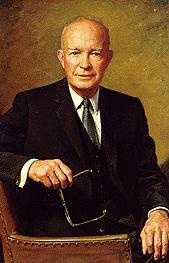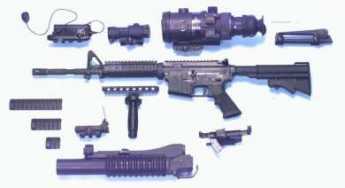Related Topics
Foreign Affairs
This topic is under construction. Feel free to watch it evolve.
Eisenhower, Reagan and Rumsfeld

|
| Donald Rumsfeld |
At the moment, the coherence of the motives of Secretary of Defense, Donald Rumsfeld, and the retired military officers who united in denouncing him can only be dimly imagined. At best, we can expect future revelations to tell us how close we came to the truth. But let's take a stab at it.

|
| President Eisenhower |
More than fifty years ago, President Eisenhower baffled most of us by warning about the Industrial-Military Complex, which we now see about like this: military contracts are awarded for future weapon development in the civilian sector. This system was first devised in 19th Century Germany, with great success in providing the German High Command with new weapons and methods of warfare which three times brought Germany close to conquering Europe. No doubt, many of the more intellectual officers of the military had dreams and fantasies which translated into Requests for Proposals. No doubt, some scientists brought ideas of workable research projects into receptive military conferences. It's hard to say where such a process begins, so it's fair to call it a Complex.
Although we fought some moderate-sized wars during the period from Eisenhower to the end of Reagan's second term, there's a short-hand way of describing the Industrial Military Complex during that time: we devised a regular succession of new weapon systems, all of which we hoped we would never use, some of which we had little intention of using. The poster example was Star Wars, the threat of which caused the the Soviet Union to surrender the Cold War when in all probability Star Wars was a project that didn't even work. Never mind the oversimplification; this will suffice as a framework for a different proposition.

|
| Weapons System |
The spin-offs from this military research underlie the sudden flowering of peaceful products from Silicon Valley, and the suburbs of Houston and Boston. Japan, mandated to avoid military development, was particularly active in developing peaceful spin-offs from new technology. Over in the world of the professional American military, the spin-offs were somewhat different. Each new technology needed to be carried forward into what was called a weapons system, where whole industries were shaped around the idea of mass-producing it, and regiments of young officers planned their future careers as the spear-heads of the new advance in warfare. And then, as often as not, the weapon system was totally dropped in favor of some newer weapon concept, with new industries to profit from its production and new officers to promote their careers as the leaders. It was a great system for the research industry, but it was hard on its supporters and disciples.

|
| Al Queda |
Meanwhile, there were two other negative responses. Military leaders in the underdeveloped world began to imagine their masses of troops and low-technology style might be able to win wars of attrition against a more sophisticated enemy, and in turn the North Koreans, the Vietnamese, and Al Queda taught us some unexpected lessons. The American military was not asleep, we made short work of the same Afghans who had nearly bled the Russians to death. These constant reminders that the world remains a dangerous place exposed two major weaknesses in the system of devising new styles of warfare. You can't be really sure it works until you try it with live ammunition on a serious enemy, and you can't be sure you can sustain an occupation of a defeated enemy's territory without boots on the ground.
So the little wars in Afghanistan and Iraq tested the new systems for weaknesses to be corrected, and identified weapon systems which ought to be expanded for more serious wars somewhat to the East. You hate to believe our leaders are thinking this way, but there's no doubt we would blame them if they hadn't identified Humvee's need more side armor, body armor's need for more ventilation, that the CIA needs more language experts. Military robots are attractive ideas, but they still require a desperate enemy to search out their weaknesses.
On one level, of course, all of this is terribly plausible. On another level, soldiers are getting killed by it. It is certainly easy to sympathize with officers who had been trained to fight the old way, the tried and tested one. Or with others who had staked their whole future career on the potential of a weapon system which was never adopted. It's easy to believe your pet project was an unsuccessful contender for reasons of local or partisan politics, more bitter still when you see plain evidence that was true. And particularly when the top civilian leader did not come through the same cultural conditioning of the military academies. It must have been particularly frustrating for academy graduates to encounter a Princeton man who was described by Henry Kissinger as the most effective bureaucratic infighter he had ever met. On his second tour at the job of Secretary of Defense, nearing the end of his term. It upset all of the stereotypes of the tribe.
Let's look at this infighting in a larger sense. Although the professional military would undoubtedly express offense at being described as just part of the bureaucracy, it can sometimes be useful to consider them as such. George W. Bush came into the Presidency muttering that one way to control the bureaucracy was to starve them to death; reduce the taxable income of the government, and inevitably the size of the government structure would have to shrink. Since in fact, he allowed the federal budget to grow, it can be argued his talk of starving the government into shrinking was just a bluff. But the bureaucrats weren't so sure it was a bluff; this guy seemed to march to a different drummer. The lower orders of the bureaucracy have considerable pride in their work, which is undoubtedly superior to what prevails in state government. The upper echelons secretly believe they are smarter and better educated than their political bosses, and like the English civil service, retreat into the "Yes, minister" mode of self-defense. All of this career anxiety is threatened by a President who openly speaks of starving the government into a smaller size. And while there are many major differences between the professional military and the professional bureaucracy, on this point they are just about the same. Nevertheless, the country cannot stand by and permit open insubordination or the overthrow of political control by the civil service. Maybe the civil service really is getting a little too big.
Originally published: Thursday, June 22, 2006; most-recently modified: Thursday, May 16, 2019
| Posted by: Mjr. Dzaster | Nov 22, 2007 2:54 PM |
Interesting commentary indeed. Factually and perceptually well-conceived I must say. And certainly it must be by such a well educated thinking man and doctor. All of what I read above impressed me considerably.
But there are the factors not really mentioned such as why the elitists who run our country choose to run in the way that they do. If I were to believe for one instant that a group calling themselves Al Qaeda were solely responsible for the attacks on New York and Washington by this terrorist organization, then I must have ignorantly purchased some swamp real-estate in the Okefenokee Swamp in Georgia somewhere.
What bothers me is how out of control our government has truly become. The citizens of this once great nation have been lulled into a state of unconsciousness never before seen in our history, and the reason is simple enough to explain. Consumerism is out of control.
The banking system is a predatory system. People pay their bills with credit cards because they have no money. The Federal Reserve Bank is in no way related to the federal government. It is a privately held bank which loans money to the government. By constitutional law, the Congress is supposed to be printing our money, which means they are supposed to be in control of our money, and they are not. And when I confront my representatives in Congress and my Senators about why the government is borrowing money from a private banking system, they refuse to answer the question.
So the whole system that runs this country can do no more at this point other than begin its rapid disintegration into a third world economy as it is now doing. The illegally taxed citizens of this country need only to stop filing their highly illegal and obviously unconstitutional labor tax. The IRS will argue that people such as myself who ARE patriots to this country are breaking the law. But there IS NO LAW stating that you or I have to pay a tax on our labor. And it has been proven time and again in courts of law right here in the good 'ol U.S. of A.
My feeling about whether or not we even need a military infrastructure is that we do. But, 41% of my total and illegal Income Tax is spent on the Military Industrial Complex of Pork Barrel Spending which only in the end profits those who own such War Profiteering Corporations such as Richard B. Cheney and others like him. Personally, it has taken many decades for me to wake up to the truth as to who my leaders really are and what they actually stand for ... which is for themselves and ONLY themselves. The rest of us have to fight these Corporate Criminals to the very end.